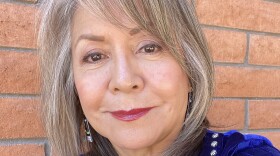-
Award-winning Navajo writer and Arizona State University professor emerita Laura Tohe was recently appointed Arizona poet laureate. She's the second-ever person to serve in the role that's been vacant for seven years.
-
New Mexico poet Tina Carlson's latest book, Obsidian, focuses on metamorphosis. She says poetry can take the otherworldly, the unsayable or the horrific and alchemize them into language that can move and sometimes heal.
-
Colorado poet Rosemerry Wahtola Trommer's book, "The Unfolding," examines the complex space she inhabited after the death of her 17-year-old son, Finn. It’s a liminal realm where heartbreak and happiness, wonder and grief dwell side by side.
-
Oklahoma native Patricia Bassel says poetry has never been more important than it is right now because of its singular ability to bring people together. She reads her poem, “In the Evening He Reads His Way into the Next Dream.”
-
Catherine Strisik is the former poet laureate of Taos, N.M. For her, startling events, both large and small, are often the catalysts for a new poem.
-
Vivian Carroll's work contains wisdom gained from a deep well of experience from years working in regional theater as well as teaching costuming to prospective circus clowns. She says the key to writing a good poem is to let the ideas marinate.
-
Flagstaff poet Lydia Gates specializes in slam poetry, which is a medium that has a unique ability to connect with people. Because it's often less reverent than what's found in literary journals, Gates says it’s an excellent vehicle for political and social issues.
-
Phoenix-based poet Marlana-Patrice Pugh Hamer talks about channeling her work from a spiritual dimension and becoming a vessel for the written word. She reads her poem “Our Giant Steps," which is dedicated to her late husband and celebrates their shared love of jazz and the good times that often accompanied live music.
-
Former Taos, N.M., poet laureate Sawnie Morris says as a young girl poetry showed her how events and objects were connected in curious ways. In the latest installment of PoetrySnaps!, she reads her piece called “After the Late-Winter Car Trip.”
-
Tacey M. Atsitty is a Diné poet from Cove, Ariz., but grew up in Kirtland, N.M., and reads “A February Snow.” She says the ideas that become poems start from place of quiet and her job is to cultivate the silence and be ready to pay attention when the seeds of a piece start to reveal themselves to her.

Play Live Radio
Next Up:
0:00
0:00
Available On Air Stations










